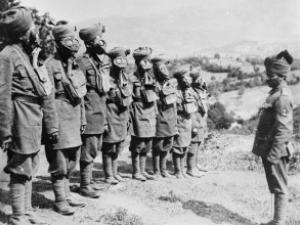Short Description
Acknowledging the heroism of Muslims during the First World War, a Birmingham education scheme aims to educate pupils on the bravery of almost a half million Muslim soldiers in the lines of the British army during the Great War.
Acknowledging the heroism of Muslims during the First World War, a Birmingham education scheme aims to educate pupils on the bravery of almost a half million Muslim soldiers in the lines of the British army during the Great War.
“We should not forget their contribution, because remembering it is so important to our contemporaries. Commemoration is a force of good in the community because it brings people together,” British Future project coordinator Avaes Mohammed told Birmingham Mail on Saturday, October 24.
“It gives a sense of belonging in this country. It gives young people a stake in this country.”
Mohammed was talking about the forgotten Muslim heroes whose names have been erased from the history books, despite giving their lives to the country.
The British Future project coordinator is spearheading a scheme to educate Birmingham children about the crucial role played by Muslim troops in WWI.
Funded by the Heritage Lottery Foundation, the project offers history lessons to a Muslim group from Lozells and a group of non-Muslims from Kingstanding.
Besides the lesson, students will have the chance to interview descendants of soldiers who fought in the war.
The project, which is run by British Future and New Horizons In British Islam, is one of four across the country that makes up “An Unknown And Untold Story – The Muslim Contribution To The First World War”.
Though hundreds of thousands of Muslim soldiers fought in WWI, only 22 percent of Britons know their sacrifice, according to a recent survey by British Future, a think-tank dedicated to racial integration.
The survey also found that only 2% are aware of the scale of that sacrifice.
Indian Troops
Around 1.3 million soldiers from undivided India fought for the British Empire during the war. About 74,000 of those soldiers died.
“Almost one-and-a-half million men from India took part in the war,” Mohammed said.
“That is more than all the other Empire countries put together.
“They fought on the Western Front, in the trenches, when the Germans were making great advances and they were instrumental in solidifying the British force.”
The heroism of Eight Indian nationals was recognized when they received the highest military honor for their bravery, the Victoria Cross.
The Muslim Khudadad Khan, of the 129th Duke of Connaught’s Own Baluchis, was the first Indian soldier to receive the VC.
Khudadad Khan, a machine gunner in an Indian colonial regiment, fought on the Western front during WWI in support of the British Expeditionary Force.
Khan was a member of the 129th Baluchis regiment fighting near in Belgium.
On 31st October, 1914, at Hollebeke, Sepoy Khudadad carried on firing the gun on his own, after the five other men of his gun detachment were killed.
Despite having been wounded, he fought on long enough to hold off an enemy advance until Indian and British reinforcements arrived. He was awarded the highest military award for gallantry by King George V in December that year.
“Because it was the first VC, it has become symbolic of the way the Muslims had engaged, with dedication, absolute courage and valor,” said Mohammed.
“It was said if a man fell, you should not go back to the battlefield to pick him up. But it was quite common for Muslim soldiers to go back because that is part of the culture. They would not leave their own unburied.”






![نصيحتي لك: اذكر الله [1 / 12] نصيحتي لك: اذكر الله [1 / 12]](http://97.105.52.213/images/upload/content_thumbs/1913613138ragheb-al-serjany-videos.jpg)


Comments
Send your comment